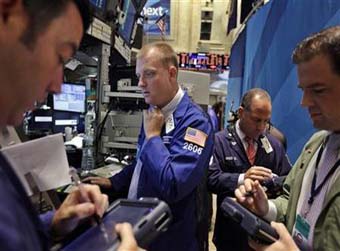U.S. shares swung between gains and losses, following the biggest weekly decline in 2012, as investors weighed Francois Hollande’s election as France’s president and Greek voters flocking to anti-bailout parties.
American International Group Inc. (AIG) fell 4.3 percent as the U.S. Treasury Department sold $5 billion of shares. Banks in the Standard & Poor’s 500 Index gained as Warren Buffett said the nation’s lenders have “liquidity coming out of their ears” and are in better shape than European rivals. Walt Disney Co. (DIS) rose 1.3 percent as the movie “Marvel’s The Avengers” earned a record $200.3 million in its opening weekend.
The S&P 500 slipped less than 0.1 percent to 1,369.01 at 12:09 p.m. New York time. The benchmark measure for U.S. equities fell 2.4 percent last week. The Dow Jones Industrial Averagedecreased 30.35 points, or 0.2 percent, to 13,007.92.
“The perception is that European governments are not going to do anything stupid,” said Paul Zemsky, the New York-based head of asset allocation for ING Investment Management. His firm oversees $160 billion. “We’re talking about changes on the margin. We’re not talking about a wholesale change in fiscal policy. There was a big reaction to well telegraphed news. It’s good to see a bounce form the lows.”
French Socialist Hollande, who defeated Nicolas Sarkozy, pledged to push for less austerity. His victory may sharpen tensions with key allies with Hollande advocating a more aggressive European Central Bank role. In Greece, the poll cast doubt on whether the two main parties can put together a government strong enough to implement spending cuts.
European stocks rebounded. Investors said the new French government will have little room to undo European fiscal accords. Economists at Exane BNP Paribas said the outcome of the Greek elections was more worrisome for markets than France’s as it may prompt the southern European nation to neglect commitments and trigger speculation it will exit the euro zone.
“Given the importance of the extreme votes, the next government, whatever its composition, will try to renegotiate the terms” of the European Union and International Monetary Fund bailouts, Exane economists Pierre-Olivier Beffy and Amelie de Montchalin wrote in a report on Greece today. “Given the backdrop of rising social unrest and the expected talks on the austerity programme, markets will certainly again price in the risks of Greece leaving the euro zone.”
A reduction in austerity could put more pressure on the ECB to act, according to David R. Kotok, Cumberland Advisors’ chairman and chief investment officer.
“Political momentum moves toward more monetary ease,” Kotok wrote in a note to clients. “We expect some form of balance sheet expansion before the end of this year. We expect credit spreads of weaker sovereigns to widen until the ECB enters the market or discusses that it may do so.”
The S&P 500 (SPX) dropped the most since December last week as a report showed U.S. employers added fewer jobs than forecast and Spain entered a recession. The gauge is still up 8.9 percent in 2012 on better-than-estimated earnings. About 70 percent of S&P 500 companies that reported results since the start of the earnings season have topped projections, according to data compiled by Bloomberg.


